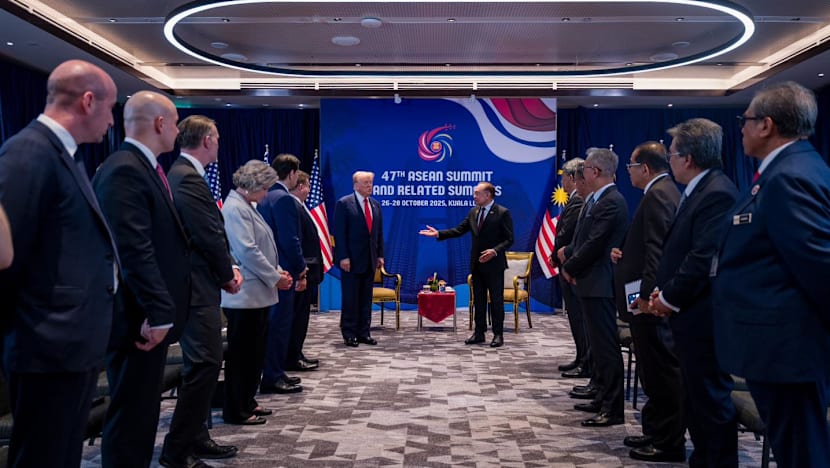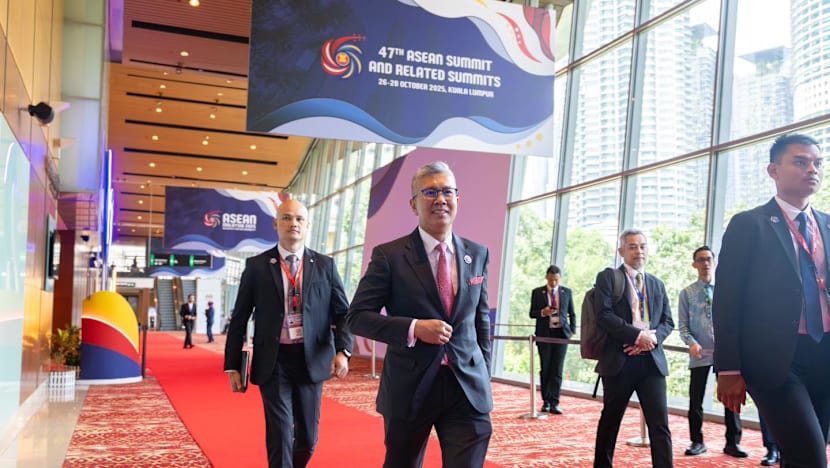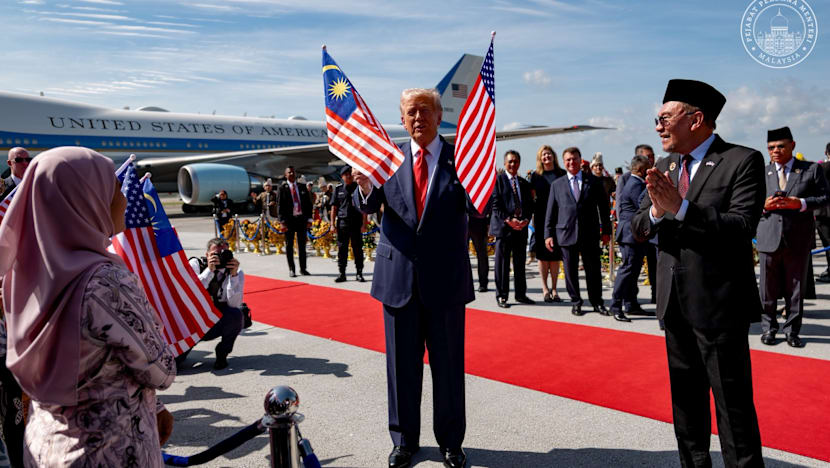Malaysia minister defends trade deal with US amid claims it undermines economic sovereignty
With politicians from both sides of the aisle raising concerns about the deal, a hearing will be held next month by the Parliamentary Special Select Committee on International Relations and International Trade.

US President Donald Trump and Malaysia Prime Minister Anwar Ibrahim is seen here during the 47th ASEAN Summit and Related Summits in Kuala Lumpur on Oct 26, 2025. (Photo: Facebook/Tengku Zafrul)
KUALA LUMPUR: Amid criticisms that Malaysia had allegedly surrendered its economic sovereignty in a new reciprocal trade agreement with the United States, Investment, Trade and Industry Minister Tengku Zafrul Abdul Aziz on Tuesday (Oct 28) defended the deal.
He added that Putrajaya was not obligated to emulate the superpower in imposing customs duties, prohibitions or import restrictions on goods and services from other countries.
Even so, with politicians from both sides of the aisle raising concerns, a hearing will be held next month by the Parliamentary Special Select Committee on International Relations and International Trade on the matter.
Among the most contentious provisions was one that purportedly requires Malaysia to align with US trade sanctions or restrictions imposed on other countries, a point raised by opposition Perikatan Nasional secretary-general Azmin Ali.
News outlet Free Malaysia Today (FMT) reported Azmin - who is a former trade and industry minister - as saying that the deal forces Putrajaya to follow Washington’s rules and regulations surrounding trade and investment.
As part of the deal, Malaysia also agreed to provide significant preferential market access for industrial goods and agricultural imports from the US.
“The Agreement on Reciprocal Trade is anything but reciprocal. It’s a one-sided arrangement that gives away too much control over our economy while the US retains the right to act in its own interests,” Azmin reportedly said.
Tengku Zafrul slammed the opposition lawmaker for selectively citing certain provisions in the deal signed with the US on Sunday – particularly that of Article 5.1 - which allegedly obliges Malaysia to mirror all US sanctions.

The article also obliges Malaysia to act against unfair practices by companies from third countries operating within its borders that harm US exports or markets, The Edge had reported.
But Azmin was not the only one to criticise the trade deal signed with the US, with some from the government’s own ruling coalition also questioning the deal.
Pasir Gudang Member of Parliament Hassan Abdul Karim – who is a member of the ruling Parti Keadilan Rakyat led by Prime Minister Anwar Ibrahim – had in parliament said that the deal would compromise Malaysia’s economic sovereignty.
“Without a single bomb or bullet, we’ve handed over our economy and our country’s wealth. Every year, we struggle to collect revenue through the Inland Revenue Board and Customs, yet we’re giving away billions to America,” Hassan reportedly said.

Separately, veteran Democratic Action Party politician Teng Chang Kim called on the Malaysian government to clarify the terms of its deal with the US, especially those that appear to favour the superpower.
Among the disputed clauses was one that purportedly allows the US to reimpose a 25 per cent tariff on Malaysia should the Southeast Asian country strike a bilateral trade deal with any nation considered to jeopardise US interests, the Jakarta Globe reported.
FMT reported Tengku Zafrul as saying that Putrajaya is only obligated to impose restrictions on other countries to address economic or national security concerns “shared” by both countries.
“This means that if a certain issue only affects the economic or national security of the US but has no impact on Malaysia’s economic or national security, we do not need to consider (emulating the US),” he said.
Separately, US Ambassador to Malaysia Edgard Kagan on Monday stressed that Malaysia did not surrender its economic sovereignty by signing the trade deal with his country, pointing out that the agreement was “extraordinarily beneficial to both countries”.
On Tuesday, Anwar said that the signing of economic cooperation agreements between Association of Southeast Asian Nations (ASEAN) countries and strategic partners underscores the bloc’s role in forging centrality.
“If we are scared of the US, how is it possible that we sign (a deal) with China a day after Trump returns. That is not possible … To me, the decisions we make are those that protect the country’s image and serve the national interest, economically, in terms of investment, and most importantly, in bringing benefits to the people,” he said during a press conference after the closing ceremony of the 47th ASEAN Summit and Related Summits.
Meanwhile, the New Straits Times reported that the Parliamentary Special Select Committee on International Relations and International Trade will hold a hearing regarding the matter, according to its chairman Wong Chen.
"The opposition members, and apparently a few of our own members from the government … have raised concerns regarding certain terms of the agreement (with the US), particularly the allegation that Malaysia may have compromised aspects of its sovereign rights in trade matters.
"In light of this, the committee is of the view that a select committee hearing should be convened to examine this matter thoroughly," said Wong.
Scheduled to be held on Nov 12, Wong said that the hearing would allow the government to explain the reasons behind the signing of the trade agreement.
Malaysia was one of four ASEAN states that had inked deals with the US during President Donald Trump’s appearance at the ASEAN summit.
There have been no reports so far of similar criticisms in the other three countries, namely Thailand, Cambodia and Vietnam.
















